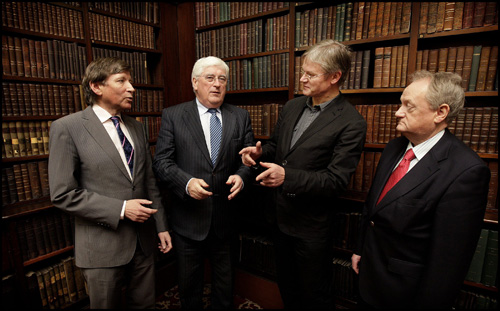‘The Place of Mathematics Education in Ireland’s Future’
Posted on: 03 February 2010
Mathematics education and the poor take-up of the subject at the higher level Leaving Certificate level has become a cause for concern, not only from a rounded education perspective but also from a skills perspective for supporting the Irish Economy. Issues such as improving basic mathematical skills, quality of teaching, increasing the supply of accredited mathematics teachers, gender imbalance, improving the pipeline of mathematically skilled scientists, economists, business graduates and engineers are all current subjects of debate. This Symposium organised by Trinity’s Faculty of Engineering, Mathematics and Science, brought together some key stakeholders on this issue of mathematics to present and debate the issue, and to produce conclusions which might inform decision-making and stimulate further action in this area. Chaired by Dr. Chris Horn, co-founder of Iona Technologies and President of Engineers Ireland, speakers included Minister for Education and Science, Batt O’Keeffe, Mr. Bill Lynch of the National Council for Curriculum & Assessment, Elizabeth Oldham of the Irish Mathematics Teachers’ Association, Ms Patricia Callaghan, Academic Secretary, TCD, Dr. Maria Meehan, School of Mathematical Sciences, UCD, Ms Una Halligan, Chair of Expert Group on Future Skills Needs, Mr. P J Rudden, Vice-President, Engineers Ireland and Mr. Paul Sweetman, Director, ICT Ireland & the ISA in IBEC.

Prof Tom Brazil, UCD, Minister Batt O’Keeffe, Dr Chris Horn, Engineers Ireland and Prof Clive Williams, Dean of Faculty of Engineering, Mathematics & Science, TCD.
The Organiser of the event, Professor Clive Williams, Dean of the Faculty of Engineering, Mathematics and Science said it was essential to engage with this important issue of mathematical education and to hear the points of view of all these key stakeholders on this important national issue. “Good mathematical skills are crucial for students taking third level courses; not just specific mathematical courses but across the board including all science, technology, engineering and mathematics (STEM) courses as well as business, economics, geography and even psychology courses.
“The Faculty recently increased its science course common entry quota form 300 to 340 students. The 2008 entry cohort had a minimum and median points level of 440 and 490 Points and > 70 % had Higher Level Mathematics in the Leaving Certificate. Over the past two years, several new undergraduate and postgraduate courses have been introduced including B.A. Earth Sciences, B.Sc. in Engineering with Management, B.A. Business & Computing and B.Sc. Human Health & Disease.”
“The Faculty will continue to endeavour to further increase our student numbers in the coming years. As such, we are keen to work with all concerned to encourage and improve the uptake of Higher Level Mathematics through conversion courses for teachers of mathematics, school visits, outreach and mentoring programmes.”
Speaking after the symposium and emphasising the importance of mathematics education, the Chair of the event, Dr Chris Horn said “For me personally, the true value of mathematics is the training it gave me in spotting patterns. Observing commonality in different situations, abstracting and learning from these to produce a generalisation, and then finally applying a specific generalisation to solve a new situation which I have never met before. As an engineer, and even more so as a software developer, these are absolutely critical core skills.”
Approximately 90 people nationwide attended including third level academics, second and primary level teachers and associations, professional bodies, business associations and public servants. It is envisaged that recommendations and discussions from the symposium will inform government and key decision makers when addressing this extremely important issue.
